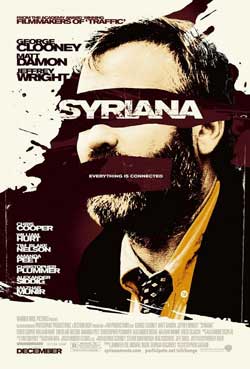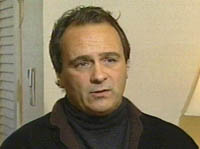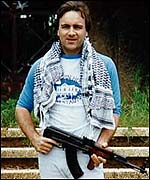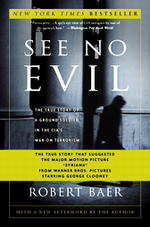 Interviewing celebrities is cool. It’s fun to sit next to George Clooney or Matt Damon as they discuss their new film, Syriana (and look for what they had to say later this week). But for me that’s becoming old hat – I’ve interviewed plenty of actors and filmmakers. What the Syriana junket offered that was quite unique was the opportunity to interview a real live spy.
Interviewing celebrities is cool. It’s fun to sit next to George Clooney or Matt Damon as they discuss their new film, Syriana (and look for what they had to say later this week). But for me that’s becoming old hat – I’ve interviewed plenty of actors and filmmakers. What the Syriana junket offered that was quite unique was the opportunity to interview a real live spy.
Robert Baer was in the CIA from 1976 to 1997. He served as a case officer in the Directorate of Operations, working in places like Iraq, Khartoum and Beirut. Seymour Hersh calls him "perhaps the best on-the-ground field officer in the Middle East." After leaving the CIA, Baer wrote a book called See No Evil that inspired part of the story of Syriana, specifically George Clooney’s CIA agent. The book is a gripping eyewitness account of the situation in the Middle East in the 80s and 90s as it boiled up until September 11th, and you can buy it from CHUD by clicking here.
Warner Bros saved Baer for the end of the press day, and many of the journalists chose to leave rather than speak with him, but I couldn’t imagine doing any such thing. This was a rare chance, and while everyone had been interesting all day, I felt that it was likely that Baer could be the most illuminating person to speak with.
Q: How real would you say the film is in how it portrays these situations?
Baer: I would say that the movie is absolutely authentic. I don’t usually watch movies, and I would never, ever watch a spy movie. But this one – it’s everybody I knew in this world. Oil traders… I spent a lot of time with Islamic fundamentalists… it was totally authentic. It was based in reality.
I traveled with [director Stephen] Gaghan and every voice – he mixed up voices and faces to do this. He spent three or four months getting these people right. We were in Monte Carlo and spent the day with an Arab prince who is just the complete opposite of the Hollywood cliché of what an Arab prince is. He was classically educated at Oxford, a polo rider. Absolutely a beautiful house, not in the least bit garish. He knew history and American literature. He has just read The Corrections.
Q: How complicated was it for you to write your book, to sit down and cover all those years?
Baer: It was complicated to make it readable because bureaucrats, CIA, government officials don’t write like normal people do. To even interest people in a very convoluted subject is hard. I think the middle of the book gets dense, with the Iranian stuff. The only people who really understand the middle part are the Israeli intelligence services.
Q: What was your most harrowing experience in the CIA?
Baer: I got shelled. I was being hunted by Iraqi helicopters. I was living in a cave with Talibani, getting shelled for a week straight. There’s nothing you can do when you’re getting shelled by 155s.
 Q: What a contrast that is to sitting in George Clooney’s house in Italy. How long did you visit him?
Q: What a contrast that is to sitting in George Clooney’s house in Italy. How long did you visit him?
Baer: A week or so. We flew in and he couldn’t have been more gentlemanly. He ran out and grabbed my suitcase out of the car. It’s hard for the CIA to meet Hollywood. He was writing Good Night, and Good Luck at the time. I didn’t even know what he was talking about – how do you take the Edward R Murrow story and put it on film. In black and white? He didn’t get any suggestions from me on that.
We talked a lot. I asked him questions, I’m a CIA officer. I asked him how do you ever get married? You’re rich, you’re famous, you’ve got a nice house, you’ve got a nice personality. How would you ever meet a girl who you knew really loved you?
Q: What did he tell you?
Baer: He said he would never know.
Q: It must be hard being a CIA agent for similar reasons.
Baer: It’s awful. That’s one of the reasons people get out of the CIA. If you’re a woman and you’re a case officer, you’re going to work all day and all night – what’s your husband going to do, sit home and watch videos when you’re assigned to Rwanda for three years? What do you do with your spouse? What do you do with your children and their education?
Q: How hard is it to get out of the CIA?
Baer: Me? I backed out firing two guns – metaphorically.
Q: My impression – and a lot of people share this – is that the CIA is a dangerous and possibly evil organization. At least that’s the emotional reaction.
Baer: That’s because you watch too many movies.
Q: Yeah, I was going to say, is there anything you can say to dissuade me from that?
Baer: It’s a bureaucracy. But the movie is looking at the evil side, which is that they’ve taken bad information to target someone overseas and kill him. The CIA does kill people, you have what is called lethal findings, in spite of 12333 Executive Order. You have the case of Khaddafi, you have the case in Yemen where they fired a missile into a car with 6 people and killed them all, they’re trying to kill bin Laden with Predators. It does happen.
My experience has been that the CIA gets into a bad position and does the wrong thing when it’s politicized. Look at the Bay of Pigs. If you look at the history of that, it wasn’t the CIA’s idea, it was Kennedy’s idea. It started with Eisenhower, he did it, he forced it through. It was done against the advice of the analysts on Cuba. Iraq – I know the name of every source they had on Iraq, and I know what they said. I knew before going into this war that that information was crap. They were using the National Intelligence Estimate from October 2002 – I knew it. I knew that Chalabi and his sources were lying and making this stuff up. I knew that the Germans didn’t know, the French didn’t know. It was a supposition that he had weapons of mass destruction. That’s what should have been in the National Intelligence Estimate. You should have had some psychiatrist saying, ‘Well, knowing as much as we know about how Saddam thinks, I’ll bet he kept some weapons.’ That’s all it should have said, because we had no evidence. But the fact is that Cheny went to the CIA until he got what he wanted. It’s the politicization of the CIA.
Inside the CIA you’ve got basically liberal people – Democrats or moderate Republicans – that don’t like torture, they don’t putting lies on reports, and they don’t like subverting governments. It’s called action but neither is it covert nor is it action. It’s just a way to fill up space in the newspaper because it always gets leaked.
Q: So what do you think of Porter Goss?
Baer: Total politicization. He was sent to the CIA to keep its estimations from getting out. The chief of station in Baghdad, who wrote in October 2003 that we can’t win the war and never could, was fired basically. He was shunted off and he knew he had to leave. He is studying for a PhD now, and he’s totally disgusted. I got calls from four or five CIA people today disgusted with the place. They don’t like the torture, they don’t like the politicization, all they care about is putting their kids through college.
today disgusted with the place. They don’t like the torture, they don’t like the politicization, all they care about is putting their kids through college.
Q: But how does this movie fit into the public perception of the CIA?
Baer: It’s going to make it worse. This is a story based on a certain degree of truth that goes beyond my book. There was a prince in the Gulf who I was dealing with who was targeted through a couple of private entities because he was talking about unitizing fields in the Gulf, which would be to the detriment of the oil companies. He was eventually kidnapped.
It’s based on bad intelligence and a CIA that’s been politicized, and it’s true. But I blame official Washington, I don’t blame the CIA. I have no problem with the CIA’s counter-intelligence program, which looks for spies and works great. We do great on countries where there’s no political interest.
Q: So this starts in the White House.
Baer: White House and Congress.
Q: Speaking of politicization, can you talk about the Valerie Plame leak? Does that, to you, rise to treason?
Baer: Yeah. They didn’t know what kind of cover she was under. And the fact that they bandied her name – my name was leaked in the campaign finance hearings of 97. They didn’t care. Democrats leaked it. There wasn’t a Justice referral. But it’s that kind of politicization that goes all through the White House.
This nonsense that Iran is going to become democratic and Westernized is total fantasy. These people are operating in a bubble. We can see with the current president that totally the opposite has happened. All you have to do is go to Iran this year and ask people what they think – in southern Tehran, ask the people who vote. You have the American Enterprise Institute saying, ‘Don’t worry, Iran’s coming around, this is the end of the Babylonian captivity’ – it’s just drivel.
Q: How do you get someone like the head of Hezzbollah to be a friend?
Baer: Hezzbollah is the most sophisticated political party in the Middle East. Why they would sit down – they sat down with Gaghan. I interviewed, for ABC, Fadlallah. They’re sophisticated. They know I’m out of the CIA. They Google my name and see I’m independent, I say anything I want – for them or against them.
Q: How about the Israelis?
Baer: They’re great. You spend a week with Shin Bet, who know the Palestinians, or you spend a week with the army – I spent a week in Hebron – and they say, ‘Let’s get out of the West Bank. It’s a waste of military, it’s dividing Israeli society, it’s not what the army is for.’ The only answer is [UN resolution] 242. The crazy settlers – I just avoided talking to them. They denied that the Hebron Massacre even occurred. Of course that’s the beginning of suicide bombings, 40 days after the Hebron Massacre. Those people deny it but they’re religious fanatics who the Israelis are more distrustful than anybody.
Q: I don’t want to give anything away, but in the film there’s an assassination. Could that kind of operation, as shown, be carried out today? Baer: Why not? They’re assassinating people all the time in Iraq today. The tribal chief that helped Gaghan understand the politics of Iraq, I was supposed to go stay with him in the war. His house was hit by 6 missiles, JDAMs they’re called. Missiles as long as this room. Killed him and everybody in his family.
Baer: Why not? They’re assassinating people all the time in Iraq today. The tribal chief that helped Gaghan understand the politics of Iraq, I was supposed to go stay with him in the war. His house was hit by 6 missiles, JDAMs they’re called. Missiles as long as this room. Killed him and everybody in his family.
There’s fabulous technology. These satellites and Predators are great. You just sit there with a camera and it’s all remote. You could be watching everybody in this room – you just need the right angle.
But what good does technology do to fight the resistance in Iraq? Yeah, you can kill people, but their relatives come after you like in Jordan. You’re just causing more problems. [Jordan happened] because we went into Fallujah. You can’t go into Fallujah and kill Bedouins, who do have blood feuds, and not get payback.
Q: Do you think there will be payback against the Sh’ia who did it?
Baer: We’re going to. We’re going to arrest family members, but that just makes it worse. It’s a cycle of violence you can’t win. The only time I have seen anyone win the cycle of violence was the Syrians, in Hama, in 1982. I was in Hama right afterwards, and they flattened the town. I don’t think that’s a good idea for the West to do, but that’s your choice.
Q: Gaghan was saying that when you were showing him around the Middle East, you weren’t just showing him around, you were looking for the people responsible for the murder of Daniel Pearl. Can you talk about that?
Baer: I’m a trained intelligence officer and ask questions. I go to Hollywood and ask questions. I was just at FX, which is over the Warner Bros lot, and I said, ‘Hey you guys have great line of sight.’ They asked what that means, and I said, ‘For audio. You can find out what Warner Bros is doing.’ It was a joke of course.
But I keep on asking questions about the Middle East. It’s a fascinating place and I want to know what makes it tick. Everybody has something new to say. So while Gaghan was doing whatever he was doing, taking notes, I was asking questions.
Q: He feels that you may feel some personal responsibility in the Pearl case.
Baer: I saw Danny Pearl a lot before 9/11. After 9/11 he emailed me from India, he was in Bombay at the time. I still have the emails. He said, ‘Who did it?’ I said that the last guy I knew who was planning to run planes into American buildings was Khalid Shaikh Mohammed. I had tapes from Khalid Shaikh Mohammed talking about this. Clandestine tapes I tried to send to the CIA, but they didn’t want to hear about it.
Q: Why didn’t they want to hear?
Baer: Because once you’re out of the CIA, you’re out for good. They don’t like people, especially like me, because I yap my mouth.
Q: Again, Gaghan felt that you feel guilt about it all.
Baer: I do feel guilt because he was in Karachi asking about Khalid Shaikh Mohammed. It was probably Khalid Shaikh Mohammed who killed Pearl.
Q: What are you doing next?
Baer: I wrote a novel called Blow the House Down. I was so tired of people asking me if 9/11 was a conspiracy so I drew up the perfect conspiracy, which you can’t disprove. It was done from the inside.
Q: When is that coming out?
Baer: May.
Q: Can you explain more about the conspiracy?
Baer: People say, ‘How did they know the World Trade Center would collapse?’ I know there’s a formula that you can put into jet fuel that makes it burn at a much higher rate once it implodes into a building. I took elements and real people – the last American who was with bin Laden was a friend of mine, he was Porter Goss’ staff director, and he was found with his head blown off in a motel room in Virginia.
Q: Did you meet Osama?
Baer: No.
Q: Clooney’s not playing you, but he’s playing a character sort of based on you.
Baer: Clooney’s perfect. He’s a burnt out guy at the end of his career and he’s got nowhere to go. He’s offered the chance to get ahead finally. He’s been out in the field, out in the trenches, for years, and he doesn’t really know how Washington works. He grabs at the chance. Everybody in the film makes compromises. I’ve certainly been offered compromises, as everybody in the CIA has at one point, to betray a principal.
Q: What do think the CIA is going to think of the movie?
Baer: What do you think Tenet’s going to think about it? They’re going to hate it. They have a whole office in the CIA that works with Hollywood that tries to make favorable movies. They were clichés, they were crap, these movies.